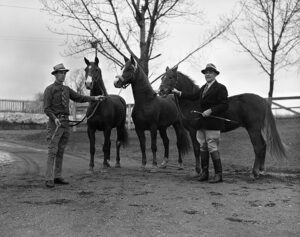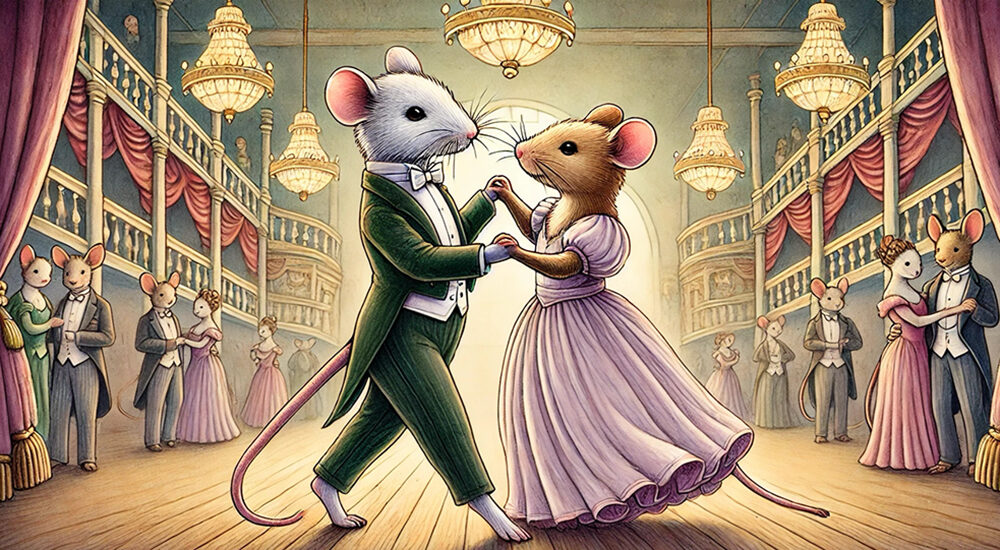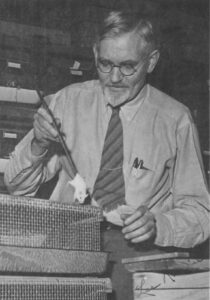High-toned nonsense
The zoologist Alexander Grant Ruthven, Michigan’s president from 1929-51, never wanted to see the University in the newspapers.
The danger was running afoul of the state legislature in Lansing. The University’s elected regents set policy independent of Lansing. But Lansing controlled much of the funding.
Since before the Civil War, legislators from upstate farm districts had suspected the University of all sorts of high-toned nonsense. President Henry Philip Tappan was even chastised for serving wine at his dinner table. And woe betide the president who authorized the spending of taxpayer dollars on impractical silliness in the laboratories of professorial eggheads.
So Ruthven must have held his breath on the morning of March 29, 1933, when he opened his Detroit Free Press to find the short item about the professor and the waltzing mice.
According to the Free Press, a professor in Ann Arbor named Lee Dice was experimenting on mice who feel “the impulse to waltz, which amounts to whirling at varying speeds” and “may seize a susceptible mouse at any time … The animal may start for an open cage door and have to stop on the way to waltz, or it may dance for minutes on end in a way which would soon kill a normal mouse.” Mice mothers seized by the urge had been known to trample their children to death in the nest.
There was a little more to the story. But Ruthven could imagine what might come if that quote were taken out of context.
‘My patience was sorely tried’

President Ruthven (right) stands next to one of his prized Morgan horses. (Image courtesy of the Ann Arbor District Library.)
“One chore the president of a state school can never neglect is the task of convincing the legislature each year that he knows what is best for his school,” Ruthven wrote in his memoir, Naturalist in Two Worlds. “The task is usually difficult, often frustrating, not seldom irritating, and over a period of years discouraging … Legislators more often than not come to the sessions uninformed of the nature of the schools they are supposed to support, and they often do not remain long enough in office to learn what they need to know to arrive at competent judgments … At times my patience was sorely tried.”
He had done his best. He invited the legislature’s Ways and Means committee to visit Ann Arbor as often as they would come. He invited the whole legislature to meet on the campus one day each year. He even invited lawmakers to his summer place near Lake Michigan, where he quartered his Morgan horses. (The president, an expert on snakes, bred and rode horses as a hobby.)
But none of that was enough to quell suspicions that campus crackpots were wasting money on trivia.
A fascination with animals
And sure enough, the next time the legislature came to campus, a newly elected lawmaker from up north raised Cain about Professor Dice and his waltzing mice. He had picked up extra copies of the Free Press and passed them out to all his colleagues.
But Ruthven was ready for this. He knew Lee Dice well. In fact, he had hired him.
Dice’s background might have surprised his critic. He had grown up working on his father’s wheat farm in Washington state. His early fascination with animals in the farms and fields led him to seek a career in biology. He earned a bachelor’s degree at Stanford and a PhD in zoology at the University of California, then policed trappers for the Alaska Fisheries Service and served in the army during World War I. In 1919, Ruthven, then director of U-M’s Museum of Zoology, spotted Dice and hired him as an instructor in zoology and curator of mammals in the museum.
With Ruthven backing him at every step, Dice chose to specialize in the still-young field of ecology. By 1933, he was doing work that would lead to a major reputation in the field. That included early studies of how genes might affect the health and behavior of mammals, a line of inquiry that would lead, in time, to groundbreaking insights. He was holding down three positions — curator of mammals, assistant professor of zoology, and research associate in vertebrate genetics — at an annual salary of $4,324.
A ‘bespectacled old gentleman’?
When the legislators next came to campus, President Ruthven remarked that he knew the University was a complex institution, so he hoped they would come to him with any doubts or questions that might arise.For instance, he said, they might have seen the puzzling news report about a faculty study of waltzing mice.
Smiles appeared around the room.
Then, out of the blue, he asked if any of them had ever seen a child with epilepsy. He described some of the symptoms. The smiles disappeared.
Perhaps, he said, when they read that news article, “they had visualized a bespectacled old gentleman sitting in front of a cage of dancing mice accompanying the gyrations of his pets with a mouth organ.”
If so, they had the wrong idea. Mice that exhibited odd movements that vaguely resembled dancing were a perfectly well-known phenomenon among zoologists, Ruthven explained. But Professor Dice, observing them closely, had developed a significant theory about them. He thought they might have epilepsy, and that the cause might be genetic. A deeper understanding might lead to a long step toward a treatment for the devastating disease.
That was the sort of work Michigan’s faculty were doing, Ruthven said. Then he went on to other things.
No apology needed
When the session was winding up, the legislator who had complained about Dr. Dice got to his feet and said: “Gentlemen, I have been a fool. From now on, anything the University asks for, I am going to vote for.”
That must have seemed like a sudden change in attitude. A year or so later, Ruthven found out why. The legislator had a granddaughter with epilepsy. Ruthven hadn’t known it, and he wrote to the legislator to say so and apologize. The lawmaker wrote back to say that no apology was called for. In fact, he had needed the lesson.
Professor Dice’s study, “Inheritance of waltzing and of epilepsy in mice of the genus Peromyscus,” appeared in the Journal of Mammology in 1935. It was one of dozens of scientific books and papers, including authoritative guides to Michigan’s mammals (in the wild and in zoos) that he would publish by the time he retired in 1957. By then he had been elected president of the Michigan Academy of Science, Arts and Letters and of the Ecological Society of America. He died in 1977.
Sources included the papers of Lee Raymond Dice, Bentley Historical Library; Alexander Grant Ruthven, Naturalist in Two Worlds (1963); Peter E. Van de Water, Alexander Grant Ruthven of Michigan: Biography of a University President (1977); “Lee Raymond Dice (1887-1977),” Journal of Mammology (August 1978); and the Detroit Free Press. The lead image was produced by the author using AI.





David Carlyon - 1971
While no Dr. Dice, I was on the receiving end of outrage of my research in grad school at Northwestern, that I was getting a PhD in something as frivolous as circus clowns. The would-be satirist ignored (or didn’t care) that mine was a deep investigation into 19th-century America, when circus was primarily for savvy adults, not kids, and talking clowns addressed political issues.
Reply
Patrick Larkey - MPP '71, Ph.D. '75
This is an important writing with important messages both about managing academic work and about the perverse role that elective politics plays when ignorant but elected officials with incentives to pander to an ignorant electoral base engage in ridicule and worse, e.g., withdraw resources from activities they do not understand. For universities to fulfill their essential roles in society, they must be safe havens for smart, curious people to work on activities that have no immediate obvious application.
Michigan has been fortunate in having administrations over the years who understood the importance of insulating the work, good and bad, of scientists following their internal compasses. To that end, Michigan administrators such as Harold Shapiro and Paul Courant intentionally but quietly reduced the dependance of the university on state funding and, hence, vulnerability to political caprice.
The University of Wisconsin, once comparable academically to Michigan, has been less fortunate. An ideologically driven governor, Scott Walker, and his band of idiots have harmed, perhaps irreparably, to the university which was more reliant than Michigan on state funding.
GO BLUE!
Reply